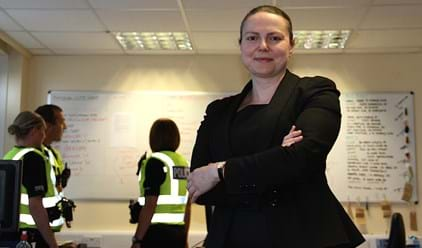Pause carousel
Play carousel
BA (Hons) Criminology and Policing
BA (Hons) Criminology and Sociology
BSc (Hons) Psychology and Counselling (Joint Degree)
BSc (Hons) Psychology with Development and Education
BSc (Hons) Psychology with Forensic and Investigative Psychology
BSc (Hons) Psychology with Forensic Scene Investigation
BSc (Hons) Psychology with Health Sciences
AHEAD - AHEAD is a part-time evening programme designed to give you access to higher education at Abertay.
MSc Applied Artificial Intelligence and User Experience
Learn to design and interrogate AI systems with a deep understanding of human behaviour using data, UX and psychology.
Please see 'Our Research' below for the areas of research focus in this Division.
If you are interested in postgraduate study in Psychology or Forensic Science, please review our areas of expertise below where we are happy to supervise postgraduate students.
Or visit our staff research profiles for more information on recent projects.
If you are looking for something more specific, check the full list of university-wide research opportunities here.
We have access to twelve dedicated staff research labs and a suite of experimental cubicles, specialised crime scene simulation areas, and a dedicated VR laboratory with Oculus Quest 2 for immersive experiments.
We have a microscopy suite and a range of analytical laboratories for analysing physiology and biochemistry, including an Atomic Force Microscope and Vacuum Metal Deposition machine.

Our research hardware includes an anechoic chamber, wall mounted remote controlled CCTV cameras, EEG with Paradigm, tCDS machine, SMI Eye View X HED Mobile Eye-Tracker and BeGaze analysis software, SR Research Eye Link II Eye Movement Recorder, equipment to measure galvanic skin response, BioHarness Telemetry System with LabChart, CUDA modelling PC, two Pupil Invisible mobile eye movement recorders, Fujitsu CRT and Sony Trinitron monitors, and a photography suite with image processing software, thermal imager, and 3D camera. Our labs are equipped with high-end PCs with appropriate licensed software (e.g., E-Prime, FaceReader, Genemapper, Gorilla, N-Vivo, Observer XT, Psychopy, Qualtrics, SPSS, Superlab) and our test library includes standardized tests of aptitude and IQ, executive function, mental health, and vision.
We also have access to the Emergent Technology Centre, a biomechanics and movement facility for high-quality video-capture and full kinematic analysis, a portable fEMG machine, and private interview rooms with recording equipment for qualitative research and training in counselling and interviewing skills. We have ongoing external partnerships for primate observation at zoos, and research links with charitable organisations including those in coaching and the performing arts.
Psychology is about understanding brains and behaviour. It seeks to generate, test, and evaluate the best explanations that we currently have, for how and why the mind works in the way it does.
Find out how people think, and develop your scientific understanding of human behaviour on one of our flexible undergraduate psychology degrees.
We train you to develop your knowledge and understanding of human behaviour, so you can then apply it to real-world situations, and transfer your skillset to a variety of careers in research, science, and business.
All our degrees are accredited by the British Psychological Society which means you are eligible to become a graduate member. This is an essential first step to becoming a Chartered Psychologist, which means you can apply for applied roles in health, education, clinical, counselling and more.
On our last accreditation visit we were commended on our vibrant academic community, approachable staff, and the opportunity for students to take a variety of assessment types and receive quality feedback on their work.
We are one of the top institutions for Psychology in the UK:
We are also in the UK Top 10 for Research Quality among modern universities that teach psychology (UoA4 REF 2021).
This means you'll be taught by dedicated staff, many of whom are producing world-leading research (UoA4 REF2021), so you can immerse yourself in cutting-edge research that improves our understanding of the mechanics of individual and group behaviour.
We offer many opportunities for students to engage in research, and many of our best graduates have successfully attracted funded research opportunities as a postgraduate.
For employment opportunities - including Research Fellowships - view the job search section on our website.
For PhD Studentships in any of our Subject areas, check out the Funded Research Projects and Postgraduate Research Funding sections.
Our research aligns with the strategic themes of the university and many UN Sustainable Development Goals including:
Peace, Justice, and Strong Institutions.
Good Health and Wellbeing.
Quality Education.
Gender Equality.
Reduced Inequalities.
We have strong research links with many local, national, and international organisations, collaborating with academics and stakeholders from over 15 countries across five continents.
Our research has attracted funding from ESRC, BBSRC, AHRC, Leverhulme Trust, EU Horizon 2020, Ministry of Defence, and the Scottish Government, with our outputs generating hundreds of citations and news articles from major outlets.
Psychology staff are focused on three research areas:

This area examines topics such as the impact of intoxication on eyewitness testimony, best-practice techniques for interviewing eyewitnesses, and the variety of circumstances and outcomes involved in missing persons investigations.
Research from this group has been commended for its impact in wider society (ESRC Award for Outstanding Impact in Society; REF2021 UoA12 impact rated 100% internationally excellent/world-leading).
Researchers in this area explore topics such language and communication (including AI research with large language models), vision science and memory.
Specific topics include how diverse user groups (e.g., older persons, people with disabilities) allocate attention when interacting with complex visual arrays, how we experience dance at the neural level and the impact of dance on wellbeing and social cognitive processing.

Researchers in this area are interested both ontogenetic and phylogenetic development
Projects include developmental research exploring biases in the processing of slef and other people (e.g., gender stereotypes), and how they impact learning and academic subject choices.
Other topics include the development of social problem-solving abilities in nonhuman primates and children, and the development of the lexicon, dialect, and speech, and how these factors shape literacy, reading, and social interaction.
We also run evolutionary psychology research, examining issues like the role of adaptive pressures in driving romantic attachments and social perception.